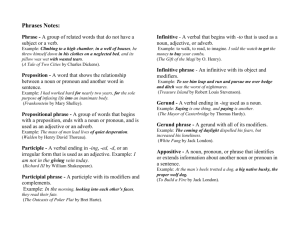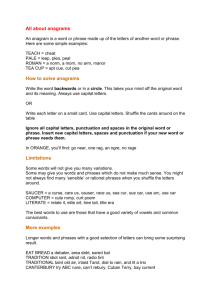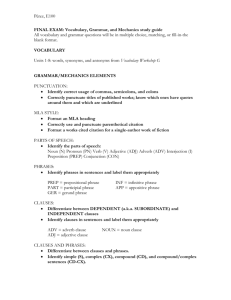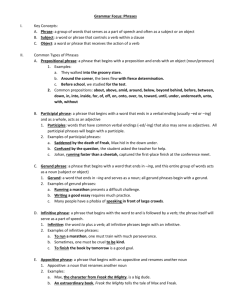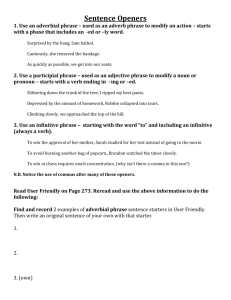Types of Phrases and their Functions Noun Phrase A noun phrase
advertisement
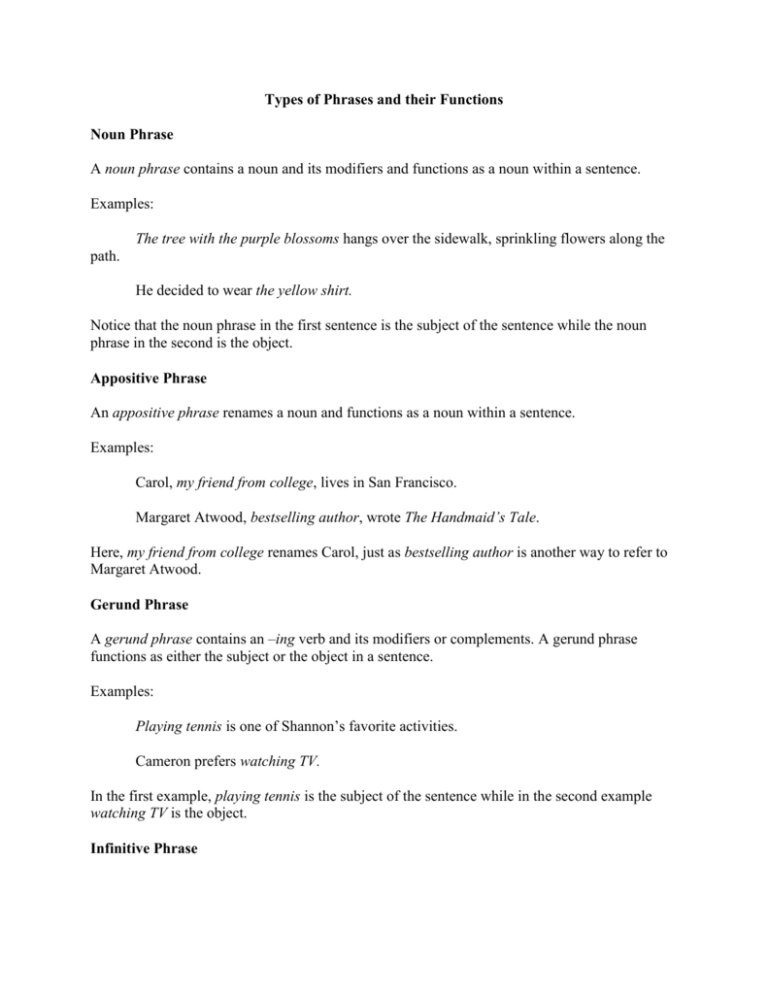
Types of Phrases and their Functions Noun Phrase A noun phrase contains a noun and its modifiers and functions as a noun within a sentence. Examples: The tree with the purple blossoms hangs over the sidewalk, sprinkling flowers along the path. He decided to wear the yellow shirt. Notice that the noun phrase in the first sentence is the subject of the sentence while the noun phrase in the second is the object. Appositive Phrase An appositive phrase renames a noun and functions as a noun within a sentence. Examples: Carol, my friend from college, lives in San Francisco. Margaret Atwood, bestselling author, wrote The Handmaid’s Tale. Here, my friend from college renames Carol, just as bestselling author is another way to refer to Margaret Atwood. Gerund Phrase A gerund phrase contains an –ing verb and its modifiers or complements. A gerund phrase functions as either the subject or the object in a sentence. Examples: Playing tennis is one of Shannon’s favorite activities. Cameron prefers watching TV. In the first example, playing tennis is the subject of the sentence while in the second example watching TV is the object. Infinitive Phrase An infinitive phrase contains a verb in its infinitive form (starting with “to”), and its modifiers or complements. Infinitive phrases can function as nouns, adjectives or adverbs. Examples: Shannon likes to play tennis. Exercising everyday is one way to increase your energy level. To get to campus, take the 7th Street exit off of the 22. The infinitive phrase in the first example functions as a noun and is the object of the sentence. In the second example, the infinite phrase functions as an adjective modifying way, and in the third sentence the infinitive phrase functions as an adverb modifying “take.” Participial Phrase A participial phrase contains a participle and its modifiers or complements. Remember that participles are verbs that end in –ing, -ed or –en (except for some irregular verbs). Participial phrases function as adjectives within a sentence. Examples: The student sitting in the front row raised his hand to answer the question. The sculpture, broken during the last earthquake, is no longer valuable. You will notice that the participial phrase in the second example is set off by commas. This is because it is a nonrestrictive phrase. That means that, while it modifies sculpture and adds detail to the sentence, if the clause were removed the sentence would still have the same meaning. Prepositional Phrase A prepositional phrase contains a preposition, a noun or pronoun, and possibly one or more adjectives. Prepositional phrases can function as nouns, adjectives or adverbs within a sentence. Examples: My birthday is on Monday. The tree with the purple blossoms hangs over the sidewalk, sprinkling flowers along the path. In the first example, on Monday functions as a noun and serves as a complement. In the second example, with the purple blossoms functions as an adjective modifying tree, while both over the sidewalk and along the path function as adverbs modifying hangs and sprinkling, respectively. Absolute Phrase: An absolute phrase most often contains a noun or pronoun, a participle, and modifiers; however, rather than modifying one single element of a sentence, absolute phrases modify the entire sentence. You’ll notice that absolute phrases (again, most often) have a subject modified by a participle but no verb. You can think of absolutes as “almost sentences” because adding “was” or “were” to most of them creates an independent clause. A second way to identify an absolute phrase is to look for a possessive pronoun (my, his, her, its, our, their) at the beginning of the phrase. You’ll find absolute phrases not only at the beginning of sentences, but also as subjectverb splits and sentence closers. Examples: His study habits thorough, Alex earned an A in the class. Lauren, her mouth watering, waited for the pasta to cool before taking a bite. The players staggered into the locker room defeated, their faces showing disappointment. In the first sentence, the absolute phrase modifies the entire independent clause Alex earned an A in the class. Likewise, the absolute phrase in the second example also modifies the entire independent clause rather than one single element of it.

